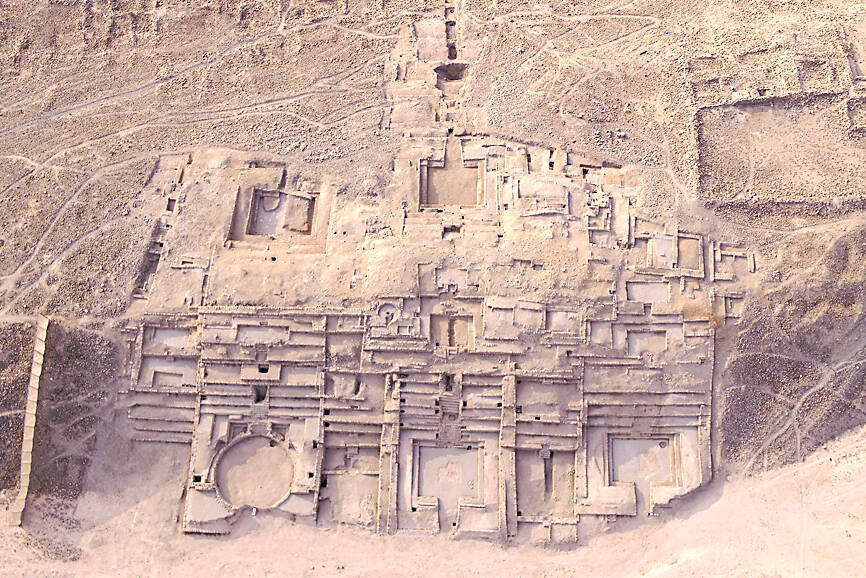To the music of conch shell trumpets, a 3,800-year-old citadel of the Caral civilization — one of the oldest in the world — opened its doors to visitors in Peru on Saturday, after eight years of study and restoration work.
The archeological site, known as Penico, was a meeting point for trade between the first human communities on the Pacific coast and those from the Andes and Amazon regions, researchers have said.
Located in the Supe valley, Penico was a hilly landscape before exploration work began in 2017.

Photo: Zona Arqueologica Caral, Handout, AFP
Archeologists believe it could hold insights into why the Caral civilization — which flourished between 3,000 and 1,800 BC — faded.
At the opening ceremony, artists from the region played pututus — traditional shell trumpets — during an ancestral ritual offering to the “Pachamama,” or Mother Earth, consisting of agricultural products, coca leaves and local drinks.
Penico was an “organized urban center devoted to agriculture and trade between the coast, the mountains and the forest,” said archeologist Ruth Shady, who leads research on the site.
The site dates back to between 1,800 and 1,500 BC, she added.
It was built on a geological terrace 600m above sea level, parallel to a river to avoid flooding. Research carried out by the Peruvian Ministry of Culture has identified 18 constructions, including buildings and residential complexes.
Researchers believe that it was built at the same time as the first civilizations in the Middle East and Asia.
Researchers are hoping the site can shed light on the crisis they think helped hasten the end of the Caral civilization, Shady said.
This crisis was linked to climatic changes that led to droughts and affected agricultural activities in the region, she said.
“We want to understand how the Caral civilization formed and developed over time, and how it came to be in crisis as a result of climate change,” she added.

VAGUE: The criteria of the amnesty remain unclear, but it would cover political violence from 1999 to today, and those convicted of murder or drug trafficking would not qualify Venezuelan Acting President Delcy Rodriguez on Friday announced an amnesty bill that could lead to the release of hundreds of prisoners, including opposition leaders, journalists and human rights activists detained for political reasons. The measure had long been sought by the US-backed opposition. It is the latest concession Rodriguez has made since taking the reins of the country on Jan. 3 after the brazen seizure of then-Venezuelan president Nicolas Maduro. Rodriguez told a gathering of justices, magistrates, ministers, military brass and other government leaders that the ruling party-controlled Venezuelan National Assembly would take up the bill with urgency. Rodriguez also announced the shutdown

Civil society leaders and members of a left-wing coalition yesterday filed impeachment complaints against Philippine Vice President Sara Duterte, restarting a process sidelined by the Supreme Court last year. Both cases accuse Duterte of misusing public funds during her term as education secretary, while one revives allegations that she threatened to assassinate former ally Philippine President Ferdinand Marcos Jr. The filings come on the same day that a committee in the House of Representatives was to begin hearings into impeachment complaints against Marcos, accused of corruption tied to a spiraling scandal over bogus flood control projects. Under the constitution, an impeachment by the

Exiled Tibetans began a unique global election yesterday for a government representing a homeland many have never seen, as part of a democratic exercise voters say carries great weight. From red-robed Buddhist monks in the snowy Himalayas, to political exiles in megacities across South Asia, to refugees in Australia, Europe and North America, voting takes place in 27 countries — but not China. “Elections ... show that the struggle for Tibet’s freedom and independence continues from generation to generation,” said candidate Gyaltsen Chokye, 33, who is based in the Indian hill-town of Dharamsala, headquarters of the government-in-exile, the Central Tibetan Administration (CTA). It

A Virginia man having an affair with the family’s Brazilian au pair on Monday was found guilty of murdering his wife and another man that prosecutors say was lured to the house as a fall guy. Brendan Banfield, a former Internal Revenue Service law enforcement officer, told police he came across Joseph Ryan attacking his wife, Christine Banfield, with a knife on the morning of Feb. 24, 2023. He shot Ryan and then Juliana Magalhaes, the au pair, shot him, too, but officials argued in court that the story was too good to be true, telling jurors that Brendan Banfield set